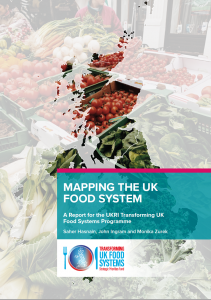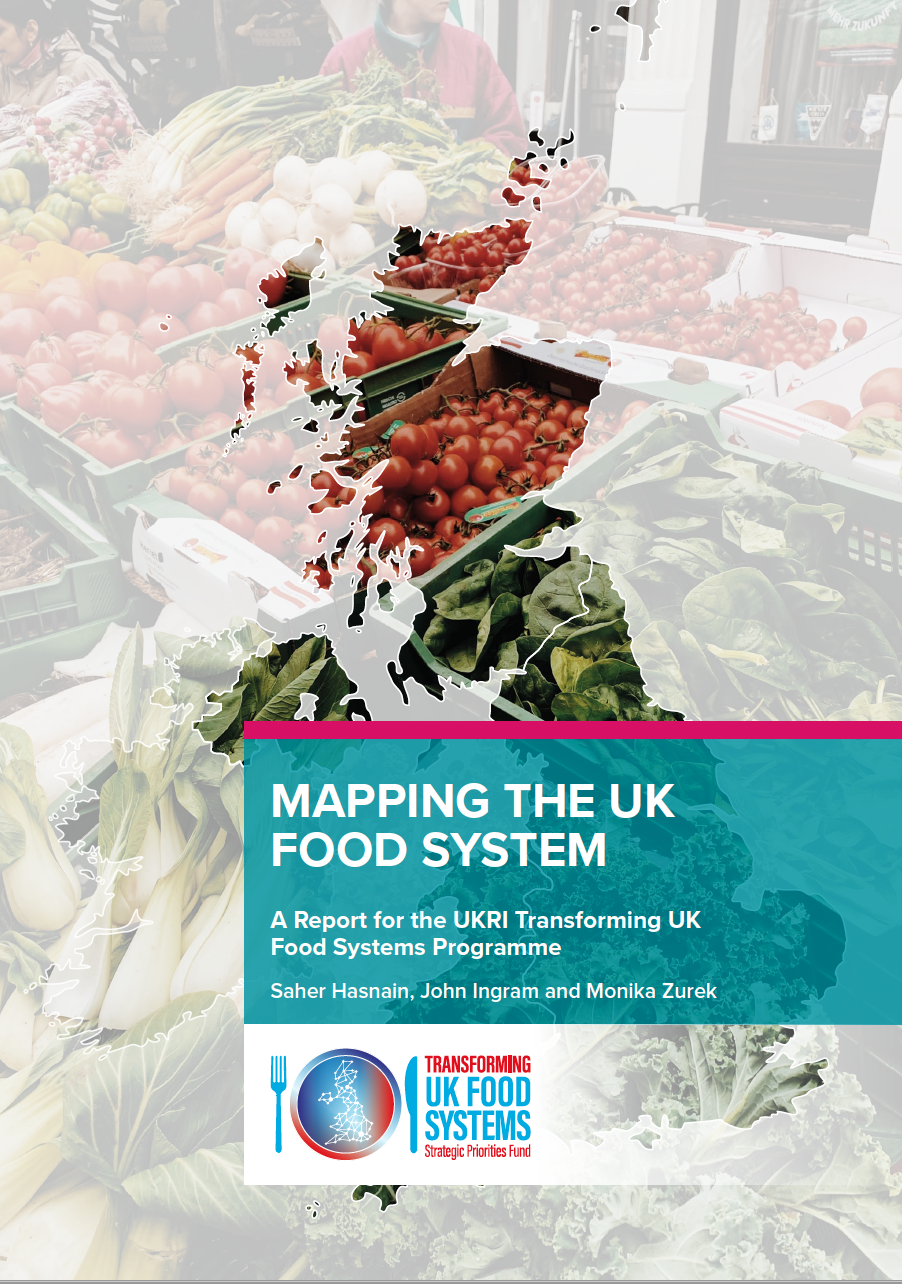The expansive UK food system has been mapped and quantified in a new report that reveals both the value of the agri-food sector and the multiple challenges it faces.
Mapping the UK Food System – A Report for the UKRI Transforming UK Food Systems Programme is the inaugural report published by the £47.5M programme ‘Transforming the UK Food System for Healthy People and a Healthy Environment’, led by the Global Food Security programme.

The study aims to act as a quantified foundation for further analyses of the UK food system. It draws together publicly available data sources, public documents and research articles, supplementing the data with interviews with stakeholders in UK food governance. The research identifies the key actors in the food system, highlighting their activities and motivations, and outlines the health, social and economic, and environmental outcomes of the food system.
The report also presents a range of existing food systems frameworks developed by projects and organisations engaged in food systems research. An accompanying interactive tool allows users to access some of the key data regarding employment, number of enterprises and economic value.
Negative outcomes revealed
While the findings make clear the economic value of the UK food industry, they also reveal a number of negative consequences in the current system. These include a heavy reliance on imports, skills shortages, poor working conditions, unsustainable production methods and diet-related disease.
Dr John Ingram, Leader of the Food Systems Transformation Group at the Environmental Change Institute, University of Oxford, led the research on behalf of the UKRI programme. He said: “In its essence, this fascinating report offers two key findings. First, it reveals the often-surprisingly large numbers related to the food sector, from the £121 billon the sector contributes annually to the economy to the 20 million slices of bread thrown away every single day. Second, it highlights negative outcomes of the current food system; these include food insecurity, malnutrition and environmental damage.”
He added that the research has shown there is uncertainty in defining the boundaries of the food system itself, even by those who operate in the sector. “We were also challenged by inconsistent definitions, disparate geographies and aggregated datasets, which all show the need for further work on harmonising our national data in this vital area.”
Understanding food system complexity
Guy Poppy, Director of the ‘Transforming the UK food system for healthy people and a healthy environment’ programme said: “How the UK food system has responded to the COVID-19 pandemic and how it affects different parts of society is frequently being discussed by politicians, the media and the public. If we are to transform the UK food system to improve human health and environmental health, we need to understand the current system and how we might undertake research which can lead to a better food system for everyone in the UK.”
“This new report maps the UK food system in an easy-to-access form for the first time, allowing the different parts and complexity of the system to be better understood. Never before have we needed this map so urgently; it helps our new UKRI strategic research priority programme develop the best research and evidence which will ultimately help us improve the health of the planet and human health not only in the UK but across the world.”
Emily Miles, Chief Executive Officer, Food Standards Agency (FSA), also welcomes the report. “As the food regulator we want to make it as easy as possible for businesses to ensure that what we eat is safe and is what it says it is,” she said. “It’s essential for the FSA to base our policy and practice on the facts. We therefore welcome this report and its contribution to our knowledge about the current food system and its make-up.”

Mapping the UK food system
This is the inaugural report from the ‘Transforming the UK food system for healthy people and a healthy environment’ SPF programme. The report maps and quantifies the UK food system and details the value of the agri-food sector and the multiple challenges it faces.
(You can view PDF documents by downloading a PDF reader. We recommend using Google Chrome or Mozilla Firefox web browsers.)
Download the report: Mapping the UK Food System (PDF, 6.3MB)
Download the Executive Summary only (PDF, 1.6MB)
Erratum
We are grateful to colleagues for alerting us to updated data. The current PDF includes the following corrections to the version which was originally posted on 4 November 2020.
- P37: Disposing and recycling; the figure of 9.5 million tonnes relates to annual post-farmgate waste in the UK, not, as previously stated, waste from the hospitality and food service sectors. (Source WRAP)
- P38: The date in Figure 24 relates only to household food waste, not, as previously stated, to total UK food waste. (Source WRAP)
Editor’s notes
This report should be referenced as:
Hasnain, S., Ingram, J. and Zurek, M. 2020. Mapping the UK Food System – a report for the UKRI Transforming UK Food Systems Programme. Environmental Change Institute, University of Oxford, Oxford.
Insights from the report include:
- Food is the biggest employer in the UK however 30% of food manufacturing employees are from the EU.
- 96% of food system enterprises are SMEs; in the hospitality sector 99% of businesses are SMEs.
- 53% of food consumed in the UK in 2018 was produced domestically, followed by 23% sourced from the EU.
- The UK trade deficit in food and drink is £24.3 billion.
- There are data gaps exist in a number of important areas including the proportion of food-related packaging in use and the proportion of food-related employment, enterprises, and turnover in supporting activities such as freight, logistics, storage, packaging, and trade.
- Agriculture contributes less than 1% to the national economy; 14% of farms failed to make positive Farm Business Income (FBI) in 2017/18 while less than a third had an FBI of over £50,000
About the Transforming the UK Food System for Healthy People and a Healthy Environment programme
The Transforming the UK Food System for Healthy People and a Healthy Environment programme aims to fundamentally transform the UK food system by placing healthy people and a healthy natural environment at its centre, addressing questions around what we should eat, produce and manufacture and what we should import, taking into account the complex interactions between health, environment and socioeconomic factors.


